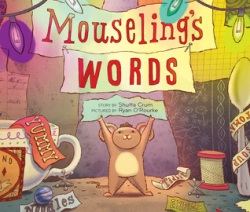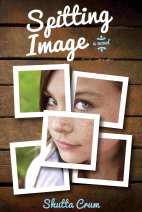by Shutta Crum
Let’s talk a minute about that list of story ideas you’re keeping for Storystorm month. You may be keeping that list in a journal—or simply on a piece of paper hung on your fridge. Either way, I know there will come a day when you will stare at it and think—I’ve shot my load. I’m all out of ideas! Of course, that isn’t true. Ideas just like to strike when you’re not expecting them—like that cousin you never got along with—sneaky gits! (Ideas & cousins!)
One place authors always look for inspiration is in their journals. I know! You’ve combed them already for this challenge. That’s fine. But the truth is you may not have been keeping exactly the right kind of journal that can help you out of a tight spot. On the 5th Mike Allegra talked about his Journal of Misfit Ideas. I like that! But I want to tell you about a type of journaling that has engendered numerous ideas for me. It’s a journal I keep by my side when I’m reading.
This is a “Good Words” journal in which I note word choices and phrases that stand out to me in the books and poems I am reading, or the lyrics I am listening to. It is a way to go back and suss out why it is that a certain author’s voice moves me. Almost always, it is word choice.
Whether we write picture books, novels, non-fiction, poetry, or beginning readers we are all word artisans, fabricators, roustabouts, and surgeons. So let’s talk about words.
It seems to me that words have personalities, and like any person there is always more than what meets the eye. Words have emotional baggage, a cultural upbringing, physical sensibilities and an historical demeanor. For example, take a look at these beautifully written lines.
- “I sound my barbaric yawp over the rooftops of the world.” (Walt Whitman, Song of Myself #52)
- “Life’s got to be lived, no matter how long or short. You got to take what comes.” (Natalie Babbitt, Tuck Everlasting)
- “I was within and without, simultaneously enchanted and repelled by the inexhaustible variety of life.” (F. Scott Fitzgerald, The Great Gatsby)
- “Have you ever heard a blindfolded octopus unwrap a cellophane-covered bathtub?” (Norton Juster, The Phantom Tollbooth)
- “During the whole of a dull, dark, and soundless day in the autumn of the year, when the clouds hung oppressively low…” (Edgar Allen Poe, The Fall of the House of Usher)
- “So the salesman jangled and clanged his huge leather kit in which oversized puzzles of ironmongery lay unseen but which his tongue conjured from door to door…” (Ray Bradbury, Something Wicked This Way Comes)
There is gut-deep emotional baggage in Whitman’s use of the word yawp, especially when it is paired with barbaric. The perfect word choice. Compare yawp to wail, or yell. Each carries a different emotional feel.
One can see the cultural differences in the language used by Babbitt and by Fitzgerald. Babbitt’s speaker is countrified, perhaps unschooled. This comes about through her use of the verb got. Fitzgerald’s character is highly educated, and perhaps a bit proud of his erudition.
Both the Juster and the Poe quotes arouse a physical (sensual) response on our part. That word cellophane paired with an octopus! And a blindfolded one at that. How perfect. Also listen to all the “d”s and the low vowel sounds (the “u”s and “ou”s) of Poe’s opener to his classic short story. The effect is one of dragging us down, just as the rider is emotionally dragged down upon his approach to Usher’s house. Or for a simpler example of the physical qualities of language: compare the word slide to scud. Which is heavier? Bet you said scud—though we never actually pick the letters up to weigh them. Vowel sounds can create emotions that can feel physical.
Finally, the Bradbury quote is a wonderful example of how language can be dressed in historical garb. The story takes place in the mid-1900s but words like ironmongery and conjure evoke an earlier, less-scientific time in which the rainmaker/salesman seems to be rooted.
When I read someone who obviously has a mastery of language I keep a list in a word journal of all the great words and phrases that writer uses. (It’s OK to learn through imitation! That’s how the masters did it, too.)
From Seamus Heaney I have listed: flood-slubs, whiff, sluicing, glarry, bogbanks, bestowals, etc. From Robinson Jeffers: enskyment. From Charles Wright: scrim & snow-scud, sealash. From M. T. Anderson: maw, starveling, suckings & buffetings. From Edith Wharton: indolent and purpling. From William Steig’s wonderful Shrek! (the original) I have; varlet, afoul, scything.
Often, just looking through this collection of scrumptious words can make ideas come to the table. Put words together from various author lists–and bingo! What if a starveling got lost amid the bogbanks on a purpling night? And then, a sucking sound rises… You get the picture.
Later, when I’m polishing my manuscript this journal helps when I’m searching for just the right descriptive word. Now, you might ask, why not just use a thesaurus? I do use thesauri. Love them! However, this is more personal. These are words that tickled my ear or made my jaw drop in awe, and were used in a masterful way. Also, when I scan them and see the word choices as groupings by author, I get a feel for how each writer created his/her own voice.
But, please! Don’t ask me about my personal daily journaling habits. I’m abysmally undisciplined. I’m much more interested in individual words than I am in words about me as an individual.
So here’s another challenge. Start a Good Words journal as you read this month. And before Storystorm ends, use it and see what happens. Here’s to jumping in and scaring up an idea before it jumps out at you like that crazy cousin of yours!
Cheers!

 Shutta Crum is the author of several middle-grade novels, more than a dozen picture books, and many poems and magazine articles. She adores speaking about children’s books and is an oft-requested presenter, guest lecturer, panel moderator, and keynote speaker. Her latest picture book is MOUSELING’S WORDS (Clarion). It’s her auto-mouse-biography—about a mouse who becomes a swashbuckler of words. The idea came from one of Tara’s Storystorm (PiBoIdMo) challenges. Thanks Tara for challenging us!
Shutta Crum is the author of several middle-grade novels, more than a dozen picture books, and many poems and magazine articles. She adores speaking about children’s books and is an oft-requested presenter, guest lecturer, panel moderator, and keynote speaker. Her latest picture book is MOUSELING’S WORDS (Clarion). It’s her auto-mouse-biography—about a mouse who becomes a swashbuckler of words. The idea came from one of Tara’s Storystorm (PiBoIdMo) challenges. Thanks Tara for challenging us!
You can follow Shutta on her blog & website at shutta.com, on Twitter @Shutta
and on Facebook here.



Shutta is giving away two prizes for two winners–a picture book critique to one winner and two of her books, MOUSELING’S WORDS and SPITTING IMAGE, to another winner.
Simply leave ONE COMMENT below to enter.
You’re eligible to win if you’re a registered Storystorm participant and you have commented once below. Prizes will be given away at the conclusion of the event.
Good luck!
Source : Storystorm 2019 Day 11: Shutta Crum Collects Words and Wields the Right Journals









